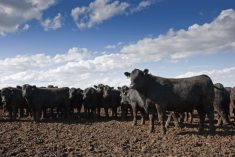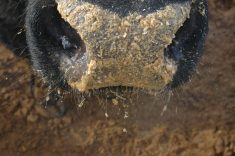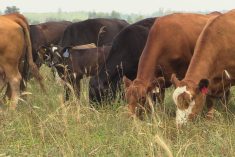Compared to last week, western Canadian yearling prices unchanged to $4 lower on average while calves were down $4 to as much as $8 in some cases. The steer-heifer spread appeared to widen by $2-$3 for yearlings and $3-$6 for calves.
Adverse weather set a negative tone and the market appeared to incorporate a risk discount on lighter weight categories. Genetic premiums eroded last week and buyers exuded a defensive tone on lighter bawlers. Groups with no health records or small packages traded at a discount. Buyers also avoided packages of unweaned calves because the transition to forage has been difficult this spring.
Read Also

U.S. grains: Soy hits 17-month high, corn to four-month top as trade braces for U.S. data
Chicago Board of Trade soybean futures rose on Thursday to their highest in nearly 17 months as traders awaited a U.S. government crop report that was expected to lower yield estimates, while also bracing for the resumption of export data to give clues on Chinese buying.
Yearling prices were also quite variable. Alberta packers appear to be well covered for their April and May requirements. Fed cattle basis levels have eroded for the summer time frame, which weighed on the yearling market. Most feedlots have their nearby feed grains covered but logistics continue to struggle. Backgrounded cattle that were fed too much grain were discounted. Major operations focused on local supplies and set strict price limits on distant ownership. Pencils have to be sharp and the risk is high if feedlot performance is poor. It’s been an extremely difficult 12 months for finishing operations and the feeder market is reflecting this prolonged period of negative margins.
In central Alberta, Simmental mixed steers on light corn ration with full health records carrying medium butter weighing 825 lbs. were valued at $185; Angus-based heifers with medium flesh levels weighing 825 lbs. with excellent data were quoted at $160. In central Saskatchewan, tan mixed steers with thicker flesh weighing 855 lbs. were quoted at $182. Southwest of Winnipeg, a group of larger-frame black mixed steers just over 900 lbs. were valued at $179.
Calves in Manitoba held a premium over Saskatchewan and Manitoba. Black medium-frame steers in southwestern Manitoba weighing 610 lbs. were quoted at $228; however, in central Alberta, black mixed steers weighing 630 lbs. were valued at $220. In southern Alberta, mixed weaned steers on forage diet weighing 535 lbs. were quoted at $228 and similar-quality heifers weighing 505 lbs. were priced at $199. Larger-frame semi-weaned black steers weighing 580 lbs. were quoted at $234 in western Manitoba.
I’m looking for a year-over-year increase in Canadian barley acres this spring. At the same time, the U.S. Department of Agriculture is forecasting a sharp year-over-year decline in U.S. fourth-quarter beef production. The feeder market has potential to strengthen in late May and June as these forecasts become more certain.
— Jerry Klassen is president and founder of Resilient Capital, specializing in proprietary commodity futures trading and market analysis. Jerry consults with feedlots on risk management and writes a weekly cattle market commentary. He can be reached at 204-504-8339 or via his website at ResilCapital.com.















